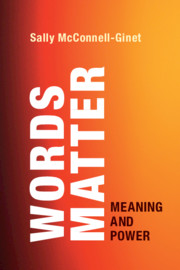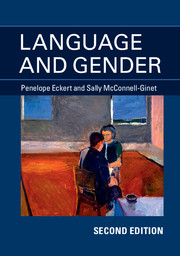Words Matter
History and current affairs show that words matter - and change - because they are woven into our social and political lives. Words are weapons wielded by the powerful; they are also powerful tools for social resistance and for reimagining and reconfiguring social relations. Illustrated with topical examples, from racial slurs and sexual insults to preferred gender pronouns, from ethnic/racial group labels to presidential tweets, this book examines the social contexts which imbue words with potency. Exploring the role of language in three broad categories - establishing social identities, navigating social landscapes, and debating social and linguistic change - Sally McConnell-Ginet invites readers to examine critically their own ideas about language and its complicated connections to social conflict and transformation. Concrete and timely examples vividly illustrate the feedback loop between words and the world, shedding light on how and why words can matter.
- Keeps technical terminology and jargon to a minimum, making it accessible to a wide range of readers
- Uses many concrete and current examples, helping readers relate discussion to their own lives
- Avoids dogmatic prescriptions about what to say or not to say, allowing readers with different perspectives to engage with the book
Reviews & endorsements
'Writing from her own experience, McConnell-Ginet shares valuable insights from scholars and experts, ceding authority to others who can add their expertise to her work. This is academic writing at its best and its most generous. Both timely and timeless.' R. Shapiro, Choice
'… an impressive accomplishment and a valuable resource on its own, and the illuminating applications of linguistic theory make the resource yet richer … McConnell-Ginet's extensive use of case studies and the application of a wide variety of theoretical tools will serve as useful resources for researchers who wish to address any of the socially important linguistic phenomena that McConnell-Ginet presents … it will be a useful tool for teaching at a variety of levels, as it provides brief, accessible discussions of a wide variety of tools from researchers from various disciplines, as well as helpful applications to concrete cases.' Gretchen Ellefson, Metascience
Product details
August 2020Hardback
9781108427210
275 pages
230 × 153 × 25 mm
0.5kg
1 b/w illus.
Available
Table of Contents
- Getting Started
- 1. Labeling: “What are you, anyway?”
- 2. Marking/Erasing: “Instead of saying 'normal Americans', you can just say 'Americans'”
- 3. Generalizing: “All the Women were White, All the Blacks were Men, but Some of Us were Brave”
- 4. Addressing: “All right, my man...keep your hands on the steering wheel
- 5. Putting Down: “[They] aren't people – they're animals”
- 6. Reforming/Resisting: “It's like a kind of sexual racism”
- 7. Authorizing: “When I use a word it means just what I choose it to mean...[but who] is to be master?”
- 8. Concluding.








